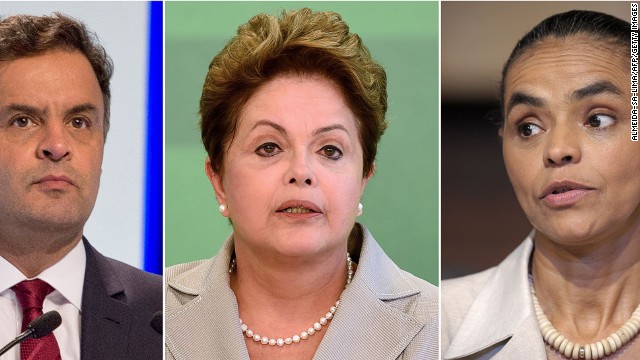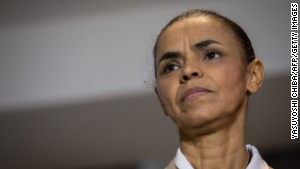Brazil presidential vote headed for runoff
updated 10:22 PM EDT, Sun October 5, 2014

Brazil's economy ahead of elections
STORY HIGHLIGHTS
- NEW: With more than 99% of votes counted, Dilma Rousseff has more than 41% of votes
- NEW: Exit polls say she'll face Aecio Neves in a runoff
- Rousseff is Brazil's first female President and was once a Marxist rebel
- Neves, an economist, is a well known career politician who vows to fight inflation
Preliminary election results
from the South American country show President Dilma Rousseff in the
lead. But she didn't get the majority necessary to win in the first
round.
With more than 99% of
votes counted, Rousseff had 41.56% of votes, Brazil's Supreme Electoral
Court said. Aecio Neves was in second place with 33.60%. And Marina
Silva was in third place with 21.30%.
Exit polls Sunday indicated there would be a runoff between Rousseff, the incumbent, and Neves, a center-right candidate. In a poll conducted by the Ibope public research firm, Rousseff won 44% of votes, Neves won 30% and Silva won 22%.
 Brazil nears vote for president
Brazil nears vote for president
 Wacky campaign ads rule Brazil's airwaves
Wacky campaign ads rule Brazil's airwaves
 Brazil candidate makes last push
Brazil candidate makes last push
Silva, an
environmentalist candidate for the Brazilian Socialist Party, had gained
momentum and backing from a growing number of supporters leading up to
the vote, with polls before the election placing her in second place.
She joined the race after candidate Eduardo Campos died in a plane crash
and was seen as a political outsider who could combat corruption. But
while she succeeded in gaining much broader support that polls had
initially predicted for her party, her third-place finish puts her out
of the running for the presidency.
Rousseff, 66, was once a Marxist rebel who was allegedly tortured in the early 1970s during Brazil's former dictatorship.
With her trademark
pixie-short hair style and thick glasses, she became one of most
Brazil's most wanted fugitives, branded by some as a "subversive Joan of
Arc."
She has a solid track
record in running the executive office. Before becoming the country's
first female president in 2011, Rousseff, from the Workers' Party, was
chief of staff to former President Lula da Silva.
She democratized
Brazil's electricity sector through the "Luz Para Todos" (Light for All)
program, which made electricity widely available, even in rural areas.
Rousseff presided over the soccer World Cup in Brazil, but she took a lot of political flack over how public money was spent.
Streets filled with
hundreds of thousands of demonstrators questioning the morality of
pumping so much money into stadiums instead of programs to fight poverty
and build infrastructure.
Rousseff defended the
spending, saying the vast majority of funds earmarked for infrastructure
projects were spent on projects for the nation, not the soccer
tournament.
And Rousseff claims that under the presidencies of her predecessor and herself, masses of Brazilians have risen out of poverty.
"We have also mainstreamed into the middle class no less than 42 million people," she has said.
But inflation is now weighing down that progress.
Neves, a 54-year-old economist, is a well-known name and a career politician. His campaign slogan promises reforms to lower inflation and encourage more investment in the country: "The sure path for Brazil to really change."
The pro-business candidate belongs to the Brazilian Social Democratic Party, one of the country's strongest.
His grandfather,
Tancredo Neves, was elected to become Brazil's president in 1985 but
died before taking office. Neves says he began his political career
campaigning at his grandfather's side.
"What motivates me in
politics is an enormous love of Brazil, a limitless desire to see things
improve, to see Brazil go the right way," he says in a campaign video.
While he'd been trailing
in some polls leading up to the election, Neves said the only poll that
mattered was Sunday's official vote.
"Let's get to the second round," he said in a YouTube video on Saturday.
Both Rousseff and Neves thanked supporters in speeches Sunday night.
Rousseff has promised her second term will be different, running under the slogan of "New Government, New Ideas."
"Once again, the people have honored me with their trust by giving me victory in the first round," she said.
Em Belo Horizonte, Aécio é carregado por populares.#Aécio45 https://t.co/jiTEve6YLa
— Aécio Neves (@AecioNeves) October 6, 2014
A video posted on Neves' Twitter feed Sunday night showed cheering supporters carrying him as cameras flashed.
This has been one of the
tightest election competitions in recent years, and it's likely to
intensify in the coming weeks, with both candidates vying for the votes
that went to Silva in the first round.
There will be three more weeks of campaigning before the runoff.
No comments:
Post a Comment